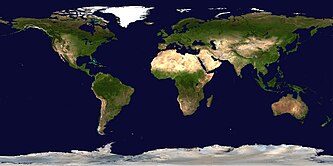This is an old revision of this page, as edited by Aitias (talk | contribs) at 22:40, 31 March 2008 (Reverted edits by 92.234.44.246 (talk) to last version by Stwalkerster). The present address (URL) is a permanent link to this revision, which may differ significantly from the current revision.
Revision as of 22:40, 31 March 2008 by Aitias (talk | contribs) (Reverted edits by 92.234.44.246 (talk) to last version by Stwalkerster)(diff) ← Previous revision | Latest revision (diff) | Newer revision → (diff) For other uses, see World (disambiguation). Antarctica
Oceania
Africa
Asia
Europe
North
Antarctica
Oceania
Africa
Asia
Europe
NorthAmerica South
America Pacific
Ocean Pacific
Ocean Atlantic
Ocean Indian
Ocean Southern Ocean Arctic Ocean West
Asia Caribbean Central
Asia East Asia North Asia South
Asia Southeast
Asia SW.
Asia Australasia Melanesia Micronesia Polynesia Central
America Latin
America Northern
America Americas C.
Africa E.
Africa H.
Africa N.
Africa Southern
Africa W.
Africa C.
Europe E.
Europe N.
Europe S.
Europe W.
Europe
The World is a proper noun for the planet Earth envisioned from an anthropocentric or human worldview, as a place inhabited by human beings. It is often used to signify the sum of human experience and history, or the 'human condition' in general. There were approximately 6.5 billion (or 6500 million) people living on the Earth as of February 2006.
Especially in a metaphysical context, World may refer to everything that constitutes reality and the Universe: see World (philosophy).
Etymology
In English, world may be parsed as rooted in a compound of the obsolete words were, "man", and eld, "age"; thus, its etymology may be semantically rendered as "age or life of man".
Usage

'World' distinguishes the entire planet or population from any particular country or region: world affairs are those which pertain not just to one place but to the whole world, and world history is a field of history which examines events from a global (rather than a national or a regional) perspective. Earth, on the other hand, refers to the planet as a physical entity, and distinguishes it from other planets and physical objects.
'World' can also be used attributively, as an adjective, to mean 'global', 'relating to the whole world', forming usages such as World community. See World (adjective).
By extension, a 'world' may refer to any planet or heavenly body, especially when it is thought of as inhabited.
'World', when qualified, can also refer to a particular domain of human experience.
- The world of work describes paid work and the pursuit of a career, in all its social aspects, to distinguish it from home life and academic study.
- The fashion world describes the environment of the designers, fashion houses and consumers that make up the fashion industry.
- The New World is a part of the world discovered or colonized by Europeans later than other parts; it usually refers to the American continents or to Australia. Native Americans and Native Australians tend to dislike this usage. For them America and Australia are not new. Their ancestors have lived there since time immemorial. The Old World refers, by contrast, to the continents of Europe, Asia and north Africa.
Physical characteristics

Earth dimensions
| Physical feature | |
|---|---|
| Superficial area | 510,000,000 km² (196,950,000 Sq. miles) |
| Land surface | 149,000,000 km² (57,510,000 Sq. miles) (29.2% of total surface) |
| Water surface | 361,000,000 km² (139,440,000 Sq. miles) (70.8% of total surface) |
| Equatorial circumferences | 40,077 km (24,902 miles) |
| Meridional circumference | 40,009 km (24,860 miles) |
| Equatorial diameter | 12,756.3 km (7,926 miles) |
| Polar diameter | 12,714 km (7,899.988 miles) |
| Polar radius | 6,356.89 km (3,949.99 miles) |
| Volume of the Earth | 1,080,000,000,000 km³ (260,000,000,000 cubic miles) |
| Mass | 5.98x10 tonnes (6.592x10 U.S. tons) |
Continents and population
|
| |||||||||||||||||||||||||||||||||||||||||||||||||||||||||||||||||||||||||||||||||||||||||||||||||||||||||
See also
External links
- "World". The World Factbook (2025 ed.). Central Intelligence Agency.
References
- 'This is the excellent foppery of the world...' -- Shakespeare, King Lear, I.ii
- David, Leonard (2006-02-24). "Planet's Population Hit 6.5 Billion Saturday". Live Science. Retrieved 2007-02-14.
{{cite news}}: Check date values in:|date=(help) - American Heritage Dictionary